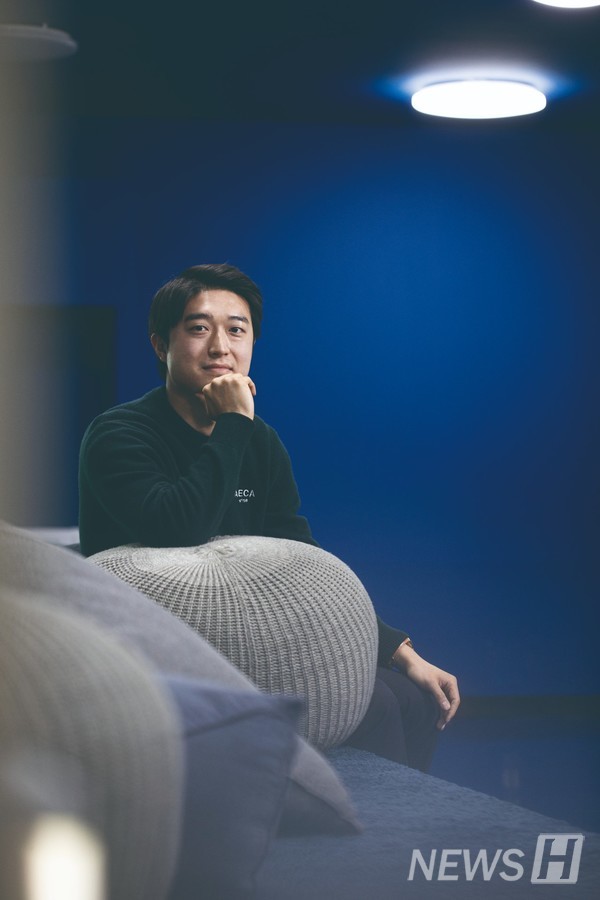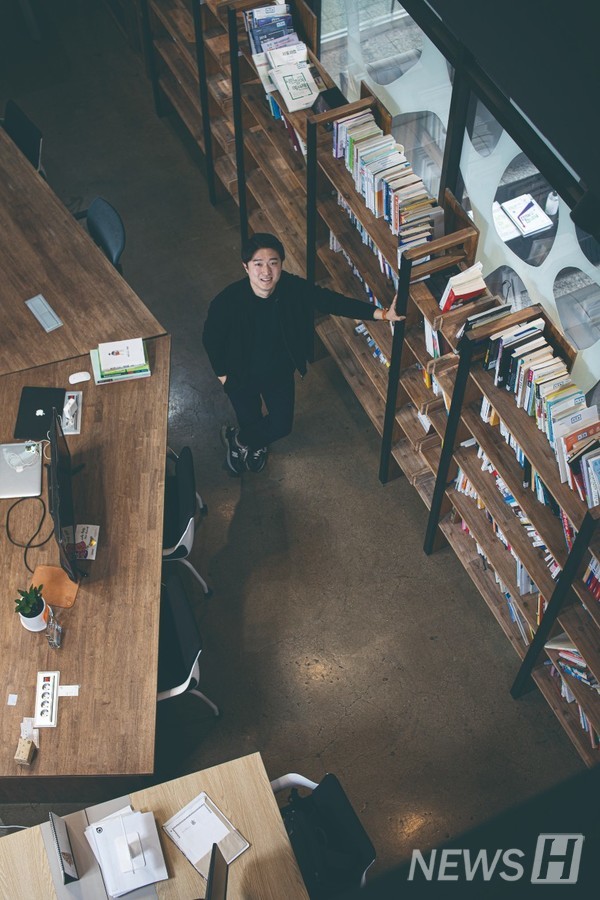Park Jungil, CEO of Loka101 (Department of Electrical and Biomedical Engineering, Class of 10)
Living space and expenses, and slums are important issues in contemporary society. In Korea, despite the decreasing population, housing prices are moving in the opposite direction. And a growing number of cities are getting older and falling behind. Under these circumstances, people with less money, such as the young generation and the marginalized, are subjected to hardship. Isn’t there any way that every person can live in a better space? We met Park Jungil, CEO of Loka101, to find an answer to the question.
Writing. Kim Hyunji | Photograph. Son Chowon

■What if old space meets the concept of sharing?
Space is an important element that has a huge impact on our daily lives and the quality of life. A pleasant and comfortable space has a positive effect on the person who stays there. A poor and backward space, by contrast, naturally has an adverse effect. Park Jungil wanted to revive abandoned places that have lost their commercial value and find a way of helping the younger generation with less money and households in poor living conditions live in a better condition. It is no exaggeration to say that his desire to catch these two rabbits led to the establishment of Loka101.
“Many spaces are abandoned just because people don’t know how to use them. I wanted to revive those neglected spaces so that young people or those in poor living conditions could use there at a reasonable price. Loka101 aims to create new value in spaces. We have regenerated around 3,275㎡ of commercial real estate, the size where a total of 226 households can live. The project cost amounts to five billion won.”
Park says that the keywords of Loka101 are “regeneration” and “sharing” of space. Loka101 discovers underoccupied, worn-out buildings in poor conditions, and then revive them through renovation and rebuilding. The newly created spaces as a result of such process are provided as residential facilities for single-person households. The brand name for the residential spaces is PIXEL HAUS.
“PIXEL HAUS is the first brand for urban renewal and sharing that we pursue. It utilizes the limited space efficiently for youth tenants and people in poor living conditions live in a better environment. Occupants have their own bedrooms and toilets and share other spaces such as the kitchen, lounge, and laundry room. By sharing spaces that people only stay briefly, it can successfully provide larger and more comfortable individual space that people regard as more important and stay for the longest time in a day.”
■“Urban shared housing” with profitability and sociability
The business model of Loka101 looks quite different from the typical rental house business. The company provides residential space that shows not only an advanced type of an urban renewal house but also urban shared housing. Its two biggest points of difference are the quality of space and extraordinary services.
PIXEL HAUS by Loka101 is gaining popularity for its fashionable and stylish space and interior design by both their landlords and tenants. The optimized space design, colors, and furniture layout arouse desires to not only take atmospheric photographs of the space, but also look around the house at least via the Internet. Loka101 controls the entire process from planning, design, construction and installation, renovation, and purchase of appliances, furnishings and accessories, to marketing and service operation. This is to create and provide higher quality space.
“As a provider of urban shared houses, PIXEL HAUS is a one-stop urban renewal solution. We cover the entire process from the beginning to the end, including even buying spoons for the shared kitchen. This is to increase efficiency in each stage. With the optimized process and reasonable cost, we would like to prevent urban areas from becoming slums and share quality spaces with others.”
PIXEL HAUS also boasts differentiated operation policies and services. It provides a pleasant and comfortable space without requiring a security deposit, maintenance fees, utility bills, and commissions; tenants only need to pay rent of around 500,000 to 600,000 won a month. What’s more, the minimum unit of its rental period is a month. Annual contracts would be more convenient for operation, but the company subdivides the period for customer convenience. The housing facility also offers simple breakfast foods for its tenants.Maybe these points of difference of PIXEL HAUS are contributing to great satisfaction among both their landlords and tenants with over 90 percent of its occupancy rate. Some tenants extend their stay there from the initial plan of three months to two years, and some have become “VIP” costumers, moving only among the branches of PIXEL HAUS when they need to move to other regions due to job transfer. Now Loka101 runs eight residential facilities in Chungmu-ro (the first and second branches), Gueui, Siheung, Mia, Seongbuk, Daebang, and Sinchon.
“PIXEL HAUS follows an impact business model. Its average annual ROI is around 25% which is six times higher yield compare to the average residential property. We are providing a service that is satisfying both owners and tenants of the building.”
■The birth of the new sharing economy based on space
Globally, the number of single-person households are increasing and housing problems faced by the young and the poor persist as well. Some say that rents are much higher in other big cities such as London, Paris, Hongkong, and Singapore than Seoul and thus, they suffer more serious housing problems. That we are still fine. But the conclusion changes when we take into account the size and quality of residential space and rent to income ratios. Space cannot be judged simply by its cost.
“I think that single-person households continue to increase. As a single-person household, I also encountered a lot of barriers in the past. Despite limited space and increasing single-person households, cities are getting decrepit. We might have to rebuild all worn-out parts of cities, but such large-scale rebuilding would be unfeasible. It will cost a vast amount of money and have a significant impact on the lives of residents in the regions. That’s why efficient sharing and regeneration of old city centers are important. This is exemplified by Seongsu-dong, Eulji-ro, and Ikseon-dong—popular spots in Seoul these days.”
From the past to the present, “space” has always been an important and sensitive topic. And this would be the case even in the future. Space is a platform that can have infinite potential, depending on how we use it.
Park Jungil plans to expand his business to various space-based services with the concepts of urban renewal and sharing and start a business based on the combination of the cryptocurrency market and real estate. He is going to provide a hybrid space for young people: a building that has residential space in the higher floors and co-working space in the lower floors. Loka101 is developing a new type of the sharing economy, bringing innovation in spaces of everyday life through regeneration and sharing.

This content was published in the 2022 Spring volume (Total No. 261) of Hanyang University's official magazine "HYPER".

